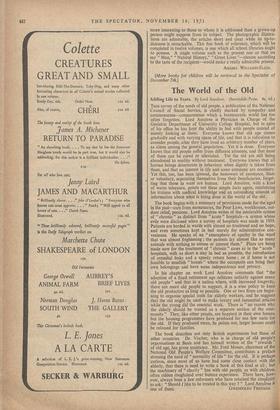The World of the Old
Adding Life to Years. By Lord Amulree. (Bannisdale Press. Bs. 6d.) THIS survey of the needs of old people, a publication of the National Council of Social Service, is chiefly marked by sympathy and commonsense—commonsense which a bureaucratic world has too often forgotten. Lord Amulree is Physician in Charge of the Geriatric Department of University College Hospital, but in spite of his office he has kept the ability to feel with people instead of merely looking at them. Everyone knows that old age comes gradually and with varying spans of life, and that it is ridiculous to consider people, after they have lived an arbitrary number of years, as aliens among the general population. Yet it is done. Everyone knows that old people suffer from different ailments, and that most of these can be cured or alleviated. Yet the old are still being abandoned to senility without treatment. Everyone knows that all human beings deteriorate in behaviour when dignity is taken from them, and that an interest in life and some company are necessary. Yet this, too, has been ignored, the bestowers of assistance, State or voluntary, separating themselves from their beneficiaries, forget- ting that those in want are human. Lord Amulree, with a kind of warm tolerance, points out these simple facts again, reinforcing his truisms with medical knowledge and an astonishing amount of information about what is being done in the world of the old.
The book begins with a summary of provisions made for the aged In the past—care from monasteries, the Poor Laws, workhouses, out- door relief, pensions. Lord Amulree writes of the intolerable system of chronic " as distinct from " acute " hospitals—a system whose evils were disclosed when a survey of hospitals was made in 1939. Patients are herded in wards with almost no treatment and no hope, and even sometimes kept in bed merely for administrative con- venience. He speaks of an "atmosphere of apathy in the ward that was almost frightening ; the patients lay almost like so many animals with nothing to amuse or interest them." Plans are being made now for the treatment of " chronic " cases as in the " acute " hospitals, with as short a stay in bed as possible, the introduction of remedial tasks and a speedy return home ; or if home is not feasible to smallish " homes " where the occupants can bring their own belongings and have some independence and privacy.
In his chapter on work Lord Amulree comments that "the adoption of a fixed retirement age militates unfairly against many old people" and that in a nation where, with increased longevity, there are more old people to support, it is a wise policy to keep the old productive as long as possible. One or two firms are begin- ning to organise special units for elderly workers, and he suggests that the old might be used to make luxury and inessential articles while the young did the essential work. There is "no reason why the elderly should be treated as a separate section of the com- munity." They, like other people, are happiest in their own homes, but the housing programmes have produced far too few units for the old. If they produced more, he points out, larger houses could be released for families.
The book describes not only British experiments but those of other countries. Dr. Vischer, who is in charge of old people's organisations at Basle and has himself written of the " rewards " of old age, has given assistance. Mr. Fred Messer, chairman of the National Old People's Welfare Committee, contributes a preface stressing the need of "normality of life" for the old. It is perhaps curious, since most of us have had some close contact with the elderly, that there is need to write a book of this kind at all ; but the machinery of " charity " has with old people, as with children, often ridden roughshod over human experience. There have, how- ever, always been a few reformers who have retained the simplicity to ask : "Should / like to be treated in this way ? " Lord Amulree 15














































































 Previous page
Previous page